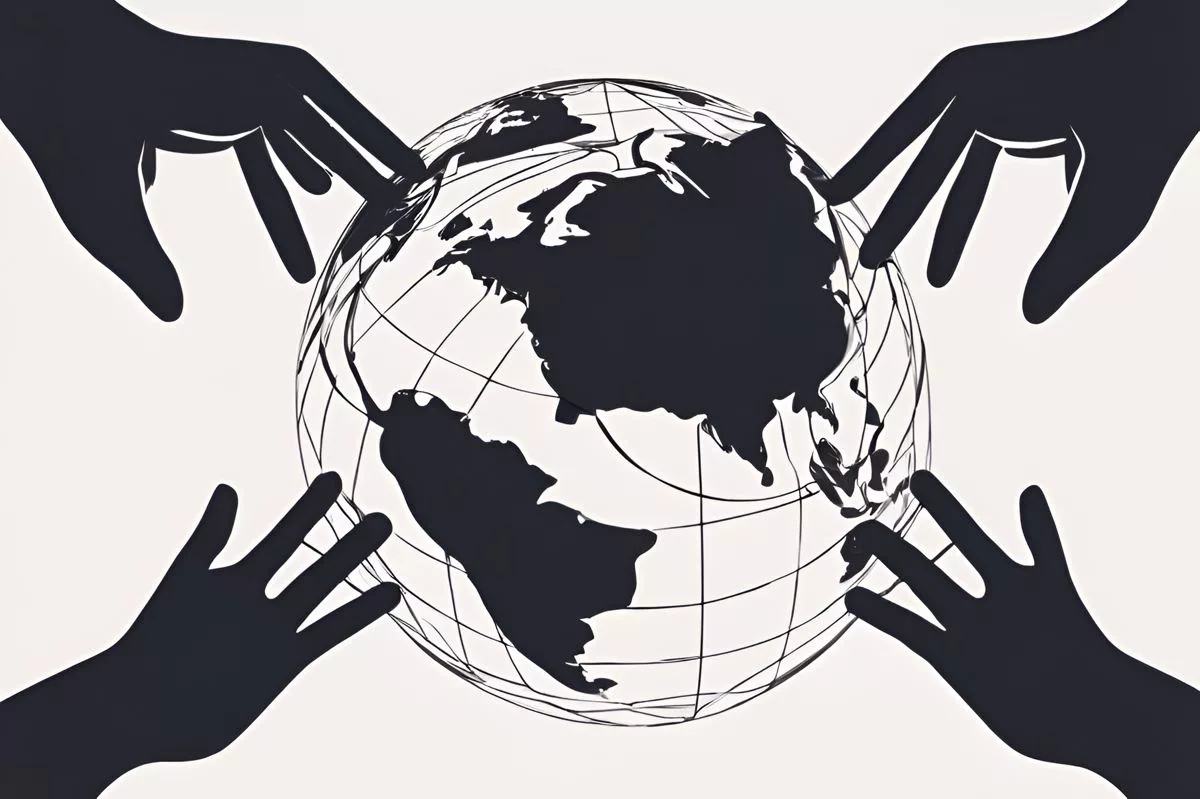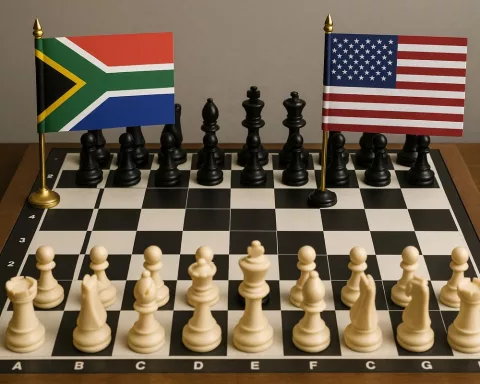Deputy Minister Kenny Morolong gave an inspiring speech at the G20 Government Communicators’ Forum, focusing on how important it is to remember our history and communicate well in government. He spoke about South Africa’s commitment to values like Ubuntu, which emphasizes caring for one another, and how the country will fight for African interests on the global stage. Morolong highlighted the need for strong teamwork between nations to tackle big issues like poverty and inequality. He urged government communicators to keep the public informed and involved, showing how G20 decisions can positively impact their lives. His message was clear: together, we can build a better world for everyone.
What are the key themes from Deputy Minister Kenny Morolong’s address at the G20 Government Communicators’ Forum?
Deputy Minister Kenny Morolong emphasized several key themes in his address:
– The importance of historical reflection and effective communication in governance.
– Aligning foreign policy with domestic values, notably the principle of Ubuntu.
– South Africa’s role in advocating for the Global South within the G20.
– The necessity of a strong multilateral system for global economic cooperation.
– Empowering citizens through transparent communication about G20 initiatives.
Honoring Historical Legacies and Shaping Modern Governance
Deputy Minister Kenny Morolong, MP, recently delivered a compelling address at the G20 Government Communicators’ Forum. His speech touched on critical themes ranging from historical reflections to contemporary policy directions, highlighting the indispensable role of effective communication in governance. Morolong began by invoking the legacy of Steve Bantu Biko, whose martyrdom stands as a poignant reminder of the ongoing struggle for freedom and justice. According to Morolong, the sacrifices made by Biko and other freedom fighters impose a lasting responsibility on current leaders to guide the nation’s discourse towards progress and equality.
Drawing a clear line between the repressive government of Biko’s era and today’s democratic institutions, Morolong emphasized that the present mission of government communicators is vastly different. In stark contrast to the past, today’s communicators aim to empower citizens through transparent and inclusive dialogue. This shift in approach is fundamental to fostering public participation and ensuring that democratic processes are robust and participatory.
Central to Morolong’s message was the significance of aligning foreign policy with domestic values. He underscored Ubuntu as the guiding principle—a philosophy rooted in human solidarity and collective well-being. This principle shapes South Africa’s internal policies as well as its stance on the global stage, promoting ideals of human rights, legal frameworks, and social advancement. Morolong pointed out that South Africa has consistently championed these values internationally, advocating multilateralism, international law, and peaceful conflict resolution. Despite its relatively modest size, South Africa has made considerable contributions toward advancing progressive internationalism.
South Africa’s Role in Global Economic Cooperation
The forum offered Morolong an opportunity to highlight the pivotal role of the G20 in global economic cooperation. Representing nearly 60% of the world’s population, 80% of global GDP, and 75% of global exports, the G20 is a key platform for shaping international economic policies. Morolong argued that South Africa must leverage its position within the G20 to advocate for the Global South, with a focus on African interests. Over the years, South Africa has consistently brought African issues to the forefront of G20 discussions, emphasizing the need for inclusive development and fair norms that benefit all of humanity, not just a select few.
A major theme in Morolong’s address was the necessity of constructing a strong multilateral system. Building such a system requires reaching a consensus among diverse global players, and the G20 serves as an excellent venue for these efforts. Morolong highlighted the critical role of global economic governance in addressing the stark disparities between those living in poverty and those benefiting disproportionately from economic systems. Achieving consensus on these issues is crucial, and South Africa’s leadership within the G20 is vital for driving these important conversations.
In addition to economic governance, Morolong stressed the importance of setting a comprehensive communications agenda for South Africa’s G20 presidency. This agenda should prioritize educating the public on the G20’s aims, structure, and benefits, particularly in the context of Africa and South Africa’s own national interests. It should also underscore the significance of South Africa’s G20 presidency, fostering youth involvement and public awareness about the advantages of hosting the G20 Summit.
Strategic Communication and Stakeholder Engagement
Effective stakeholder relations form another critical component of the communication agenda. Morolong highlighted the importance of internal government dialogues, interactions with social partners, and engagement with civil society to elevate South Africa’s status as a globally competitive and receptive nation. By showcasing South Africa’s leadership and contributions to the G20, the country can highlight its accomplishments and the benefits these bring to both the continent and the African Union.
A successful communication strategy must also secure broad public support for South Africa’s G20 leadership. Utilizing various platforms to disseminate key messages and garner positive media coverage is essential for this endeavor. Encouraging public involvement in G20 activities and sectoral gatherings can foster a sense of national pride and collective responsibility.
Morolong reiterated South Africa’s steadfast commitment to prioritizing Africa’s development on the international agenda. Key issues such as eliminating illicit financial flows, reforming international tax systems to ensure fair contributions from multinational corporations, and tackling poverty and hunger have been championed by South Africa in various multilateral forums, including the G20. The African Continental Free Trade Agreement (AfCFTA) marks a significant milestone toward achieving economic integration across the continent, and South Africa will continue to support and promote this initiative.
Empowering Citizens and Ensuring Accountability
Effective communication with the public about these initiatives is vital. Morolong called on government communicators to share information that empowers citizens, demonstrating how G20 resolutions translate into real benefits for the populace. Tracking the implementation of G20 resolutions and showcasing these achievements will help make the G20’s relevance clear to Africans and to the global poor.
As South Africa prepares to take on the G20 presidency in 2025, succeeding Brazil, numerous challenges lie ahead. Addressing these comprehensively within the communication strategy is essential for securing a social agenda that resonates with the public. Morolong concluded by emphasizing the critical importance of successful deliberations and effective communication in achieving the forum’s objectives.
In sum, Deputy Minister Kenny Morolong’s address at the G20 Government Communicators’ Forum was a call to action. It underscored the importance of historical legacies, effective governance, strategic communication, and citizen empowerment in shaping a more equitable and just global order. Through focused efforts and strong leadership, South Africa aims to make a significant impact on the international stage, advocating for the interests of the Global South and championing the principles of Ubuntu.
FAQ: Deputy Minister Kenny Morolong’s Address at the G20 Government Communicators’ Forum
What were the key themes highlighted by Deputy Minister Kenny Morolong in his speech?
Deputy Minister Kenny Morolong emphasized several key themes during his address, including the importance of historical reflection, the alignment of foreign policy with domestic values such as Ubuntu, South Africa’s advocacy for the Global South, the necessity for a strong multilateral system, and the empowerment of citizens through transparent communication about G20 initiatives.
How does Deputy Minister Morolong connect historical legacies with modern governance?
Morolong invoked the legacy of Steve Bantu Biko, emphasizing the sacrifices made by freedom fighters as a responsibility for current leaders. He contrasted the repressive past with today’s democratic institutions, asserting that government communicators now aim to empower citizens through inclusive dialogue and transparency, fostering robust public participation in governance.
What role does Ubuntu play in South Africa’s foreign and domestic policies?
Ubuntu, which emphasizes human solidarity and collective well-being, serves as a guiding principle for aligning South Africa’s foreign policy with its domestic values. Morolong pointed out that this principle shapes both internal policies and South Africa’s stance on international issues, promoting human rights and social advancement in various global forums, including the G20.
Why is South Africa’s participation in the G20 significant for the Global South?
South Africa’s participation in the G20 is vital as it represents a platform for advocating African interests and bringing attention to issues affecting the Global South. With the G20 comprising a significant portion of the world’s population and economic output, Morolong argued that South Africa must leverage its position to emphasize inclusive development and fair norms that benefit all nations.
What strategies did Morolong suggest for effective communication during South Africa’s G20 presidency?
Morolong stressed the need for a comprehensive communication agenda that prioritizes educating the public about the G20’s objectives and benefits, fostering youth involvement, and creating broad public support for South Africa’s leadership. He highlighted the importance of utilizing various platforms to disseminate key messages and engage citizens in discussions surrounding G20 activities.
How can citizens benefit from the initiatives discussed at the G20 Government Communicators’ Forum?
Morolong called for government communicators to share information that illustrates how G20 resolutions can translate into tangible benefits for citizens. By tracking the implementation of these resolutions and highlighting successes, communicators can empower the public to understand and engage with G20 initiatives, ultimately fostering a sense of collective responsibility and national pride.












